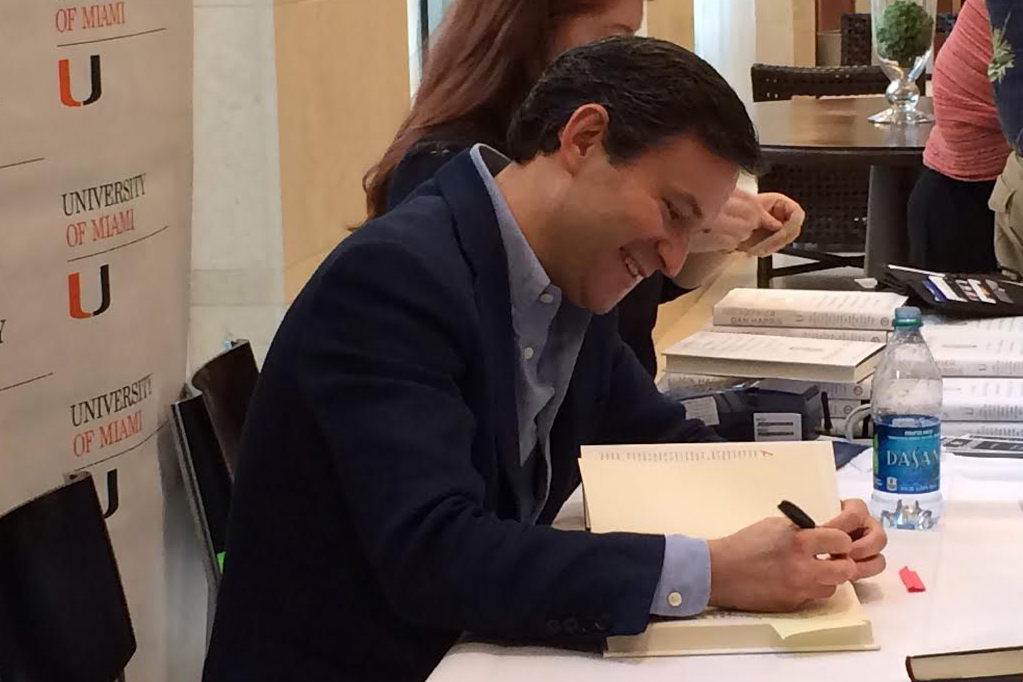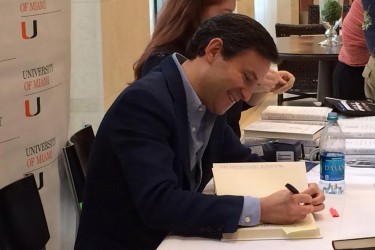

Emmy Award-winning ABC news anchor Dan Harris gave a lecture at the Newman Alumni Center Wednesday evening about how meditation changed his life and made him “a tenth happier.” Harris also became co-anchor of the weekend edition of “Good Morning America” in 2010 and of “Nightline” in 2013.
Harris’ first book, “10% Happier: How I Tamed the Voice in My Head, Reduced Stress Without Losing My Edge, and Found Self-Help That Actually Works – A True Story,” tells the story of a 28-year-old Harris starting out at ABC News in 2000. Harris had an on-air panic attack in 2004 and led him to research methods to find peace of mind.
At ABC News, Harris reported on the shootings in Connecticut, Colorado, and Arizona, and natural disasters, including Hurricane Katrina. He also covered combat in Afghanistan, Israel, Gaza and Iraq, according to his biography on the ABC News website.
Once returning from his reports abroad in 2003, Harris was diagnosed with depression. He began self-medicating with cocaine and ecstasy, altering the natural levels of adrenaline in the brain.
“When I realized that it was my drug use that was causing the panic attacks, I did two very conventional things: I quit using drugs and started going to a shrink,” Harris said. “I thought that was it, and then I stumbled into the stuff that led me into meditation.”
Harris said his goal is to eliminate any excuse a person might have to not meditate. Starting with five minutes a day was his chief suggestion. He offered three steps for meditation to the audience Wednesday night.
“Sit with your eyes closed and your back straight. Try to focus all of your attention on the breath, coming in and going out. When you try to do this, your mind is going to go nuts. The whole game is noticing when your mind is wandering and returning your focus to the breath,” he said.
Harris reached a turning point when Peter Jennings, former ABC World News anchor, assigned him to cover religion.
“In a lot of the things I saw, the advice was bad or there was no advice at all. For example, this notion that you can get anything you want by the power of positive thinking. At best, it is harmless nonsense,” Harris said. “At worst, people would presume that they don’t need to see a doctor – if they’re sick, they can just think it away. But the common denominator of all the things I saw was that people wanted to be happier.”
After delving into nearly every corner of religion and spirituality, Harris found meditation in 2009. Even after ascribing to this mindful lifestyle, however, Harris said he understands the doubts of skeptics. Before converting to meditation himself, he used to find most books on the subject annoying, he said.
“I hear you. I was there. But if you look at the science, it strongly suggests a long list of health benefits: lowering blood pressure, boosting the immune system, lowering the release of cortisol [a stress hormone], and essentially rewiring parts of your brain. It’s hard to argue that meditation is only for acid freaks and people who live in a yurt, at this point,” he said. “This is why I wanted to write something that used common language, foul language, and irony to speak to people who would reflexively think of meditation as something they could never do.”
Thirty-five minutes of meditation does not guarantee a life free from aberrations though. According to Harris, sitting down and meditating is still difficult at times. However, the benefits far outweigh the costs when it means being more compassionate toward others, he said.
“What meditation allows you to do is to take a step back and observe it from a distance,” he said. “When you can see how crazy you are, some percentage of the time you won’t act on it.”
One study performed at Massachusetts General Hospital in 2011 observed these effects first-hand. After 16 participants completed an eight-week mindful meditation program, an MRI revealed that the gray matter in areas of the brain associated with compassion and self-awareness grew. Conversely, the gray matter in areas associated with stress shrank.
“I don’t regret working hard. I regret what happened as a consequence,” he said. “I think working hard is fantastic. However, we have a tendency to be harder on ourselves than we need to be, and that can be unconstructive.”
In an interview with The Miami Hurricane, Harris said writing a book was difficult for him.
“There’s a great quote that says nobody likes writing a book; people only like having written one. That’s how I feel. It was miserable for my wife because for four years, I was walking around, thinking about pretty much nothing else. I’m happy that it’s done, and I’m never going to do another one. That’s a lie.”
This lecture was part of the UMindfulness lecture series started by Amishi Jha and Scott Rogers for The University of Miami’s Mindfulness Research and Practice Initiative (UMindfulness).





